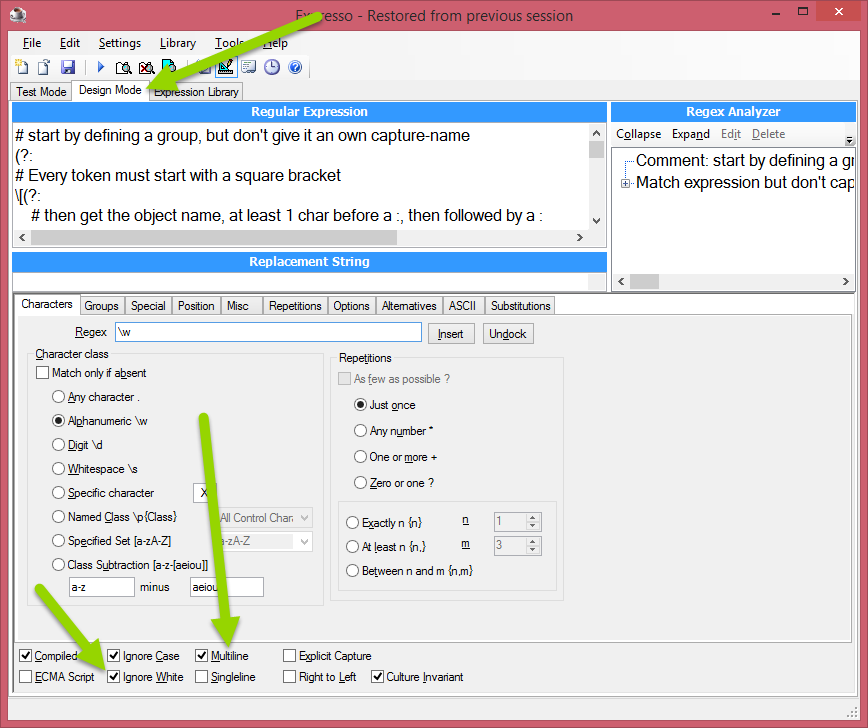
Working with large and complex regular expressions is very difficult. But now I discovered a method which makes everything easier - so this is Lessons Learned #1 from the development of 2sxc 7.
While we were working on 2sxc 7 we needed to improve the token engine. We had used the standard DNN engine so far but it had a few problems like:
- It removed empty [] from our templates - which messes um some very common AngularJS scripts
- We needed support for tokens-in-tokens - like [QueryString:SortDirection||[App:Settings:DefaultSort]] to allow queries to do things like "Try to get the sort-direction from the URL, but if it's not there, use the default value configured in the App"
The original RegEx - impossible to work with
So I had to figure out how to add this - based on the Regular Expression found within DNN. Here it is - can you work it out?
(?:\\[(?:(?<object>[^\\]\\[:]+):(?<property>[^\\]\\[\\|]+))(?:\\|(?:(?<format>[^\\]\\[]+)\\|(?<ifEmpty>[^\\]\\[]+))|\\|(?:(?<format>[^\\|\\]\\[]+)))?\\])|(?:(?<object>\\[)(?<property>[A-Z0-9._]+)(?:\\|(?:(?<format>[^\\]\\[]+)\\|(?<ifEmpty>[^\\]\\[]+))|\\|(?:(?<format>[^\\|\\]\\[]+)))?\\])|(?<text>\\[[^\\]\\[]+\\])|(?<text>[^\\]\\[]+)
Nobody I know can read this.
The best Tool I know to work with RegEx: Expresso
Download it here.
Now the tool won't help too much, but a bit.
Commenting your Regular Expressions
While fiddling around with the expression, I found out that I could add comments to my RegEx. This surprised me, as I had never seen this before. Turns out you must enable a feature, and you're ready to go. Make sure you also ignore white-space so that you can indent your expressions. In Expresso the feature is here:

You can then begin writing multi-line Regular Expressions with #-hashes in front of your comments, like this:
# start by defining a group, but don't give it an own capture-name
(?:
# Every token must start with a square bracket
\[(?:
# then get the object name, at least 1 char before a :, then followed by a :
(?<object>[^\]\[:\s]+):
# next get property key - can actually be very complex and include sub-properties; but it ends with a [,| or ]
# note that after the first character it can contain : because sub-properties must be in this key
(?<property>[^\]\[\|\s\:]+[^\]\[\|\s]*))
...
This will make your life much easier. It's still hard - as regular expressions are - but it becomes workable.
Using Commented RegEx in C#-Code
This too is not too hard - just paste the RegEx into a multi-line variable in C# using the @"..." syntax because it allows you to write across multiple lines. Then enable White-Space and Multi-Line in your RegEx object - like this:

Hope this helps you!
With love from Switzerland,
Daniel
 Daniel Mettler grew up in the jungles of Indonesia and is founder and CEO of 2sic internet solutions in
Switzerland and Liechtenstein, an 20-head web specialist with over 600
DNN projects since 1999. He is also chief architect of 2sxc (2SexyContent - see forge), an open source module for creating attractive content and DNN Apps.
Daniel Mettler grew up in the jungles of Indonesia and is founder and CEO of 2sic internet solutions in
Switzerland and Liechtenstein, an 20-head web specialist with over 600
DNN projects since 1999. He is also chief architect of 2sxc (2SexyContent - see forge), an open source module for creating attractive content and DNN Apps.